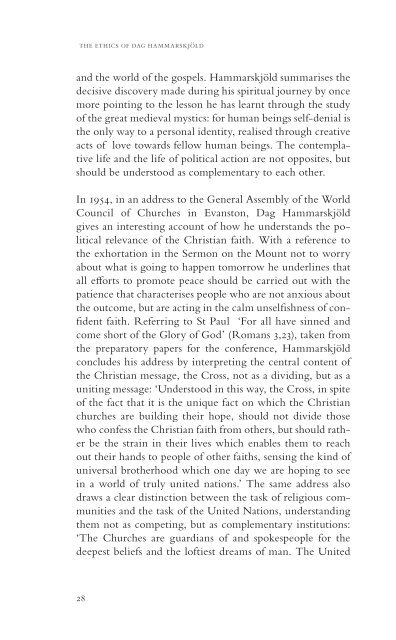Download as pdf - Dag Hammarskjöld Foundation
Download as pdf - Dag Hammarskjöld Foundation
Download as pdf - Dag Hammarskjöld Foundation
Create successful ePaper yourself
Turn your PDF publications into a flip-book with our unique Google optimized e-Paper software.
the ethics of dag hammarskjöld<br />
and the world of the gospels. <strong>Hammarskjöld</strong> summarises the<br />
decisive discovery made during his spiritual journey by once<br />
more pointing to the lesson he h<strong>as</strong> learnt through the study<br />
of the great medieval mystics: for human beings self-denial is<br />
the only way to a personal identity, realised through creative<br />
acts of love towards fellow human beings. The contemplative<br />
life and the life of political action are not opposites, but<br />
should be understood <strong>as</strong> complementary to each other.<br />
In 1954, in an address to the General Assembly of the World<br />
Council of Churches in Evanston, <strong>Dag</strong> <strong>Hammarskjöld</strong><br />
gives an interesting account of how he understands the political<br />
relevance of the Christian faith. With a reference to<br />
the exhortation in the Sermon on the Mount not to worry<br />
about what is going to happen tomorrow he underlines that<br />
all efforts to promote peace should be carried out with the<br />
patience that characterises people who are not anxious about<br />
the outcome, but are acting in the calm unselfishness of confident<br />
faith. Referring to St Paul ‘For all have sinned and<br />
come short of the Glory of God’ (Romans 3,23), taken from<br />
the preparatory papers for the conference, <strong>Hammarskjöld</strong><br />
concludes his address by interpreting the central content of<br />
the Christian message, the Cross, not <strong>as</strong> a dividing, but <strong>as</strong> a<br />
uniting message: ‘Understood in this way, the Cross, in spite<br />
of the fact that it is the unique fact on which the Christian<br />
churches are building their hope, should not divide those<br />
who confess the Christian faith from others, but should rather<br />
be the strain in their lives which enables them to reach<br />
out their hands to people of other faiths, sensing the kind of<br />
universal brotherhood which one day we are hoping to see<br />
in a world of truly united nations.’ The same address also<br />
draws a clear distinction between the t<strong>as</strong>k of religious communities<br />
and the t<strong>as</strong>k of the United Nations, understanding<br />
them not <strong>as</strong> competing, but <strong>as</strong> complementary institutions:<br />
‘The Churches are guardians of and spokespeople for the<br />
deepest beliefs and the loftiest dreams of man. The United<br />
28
















